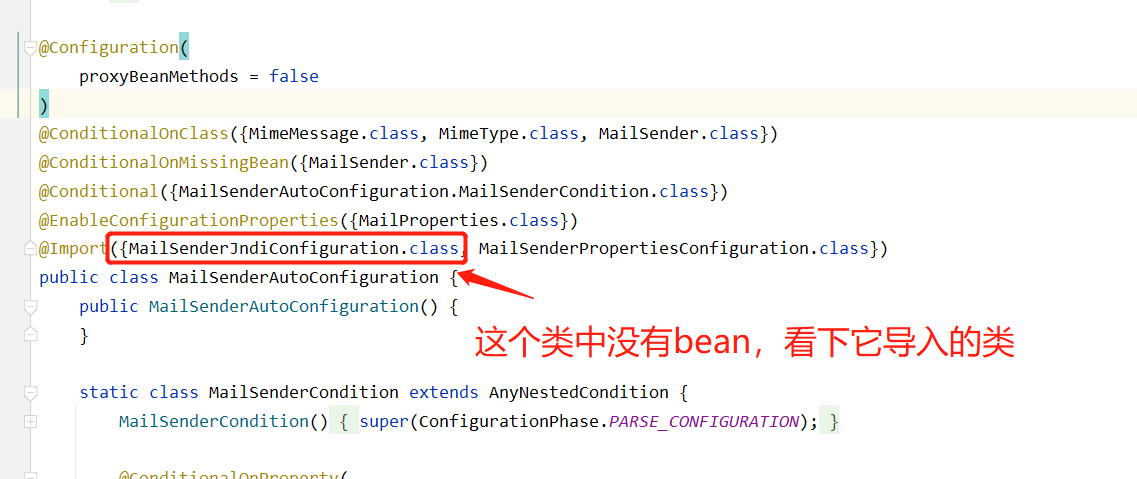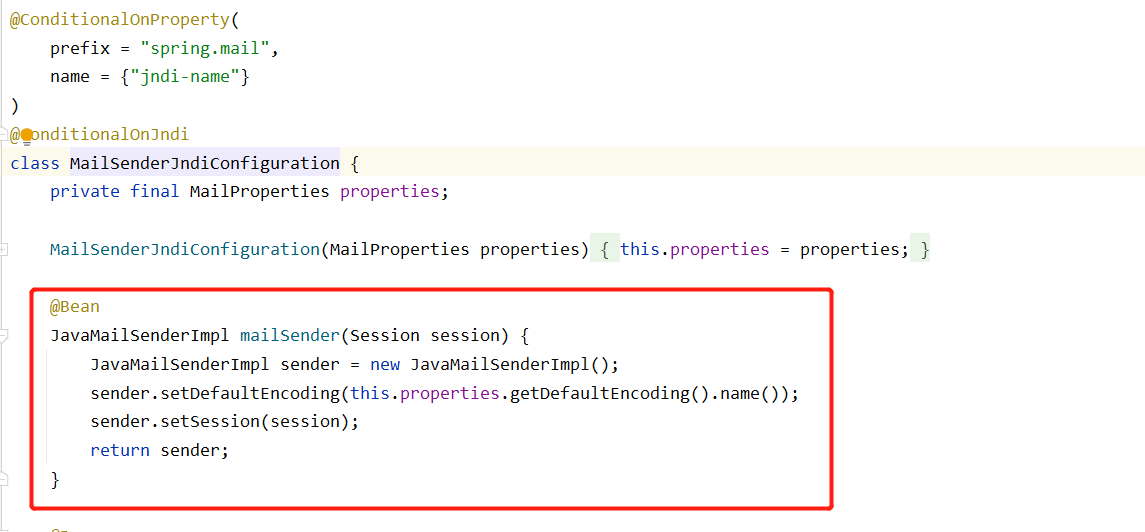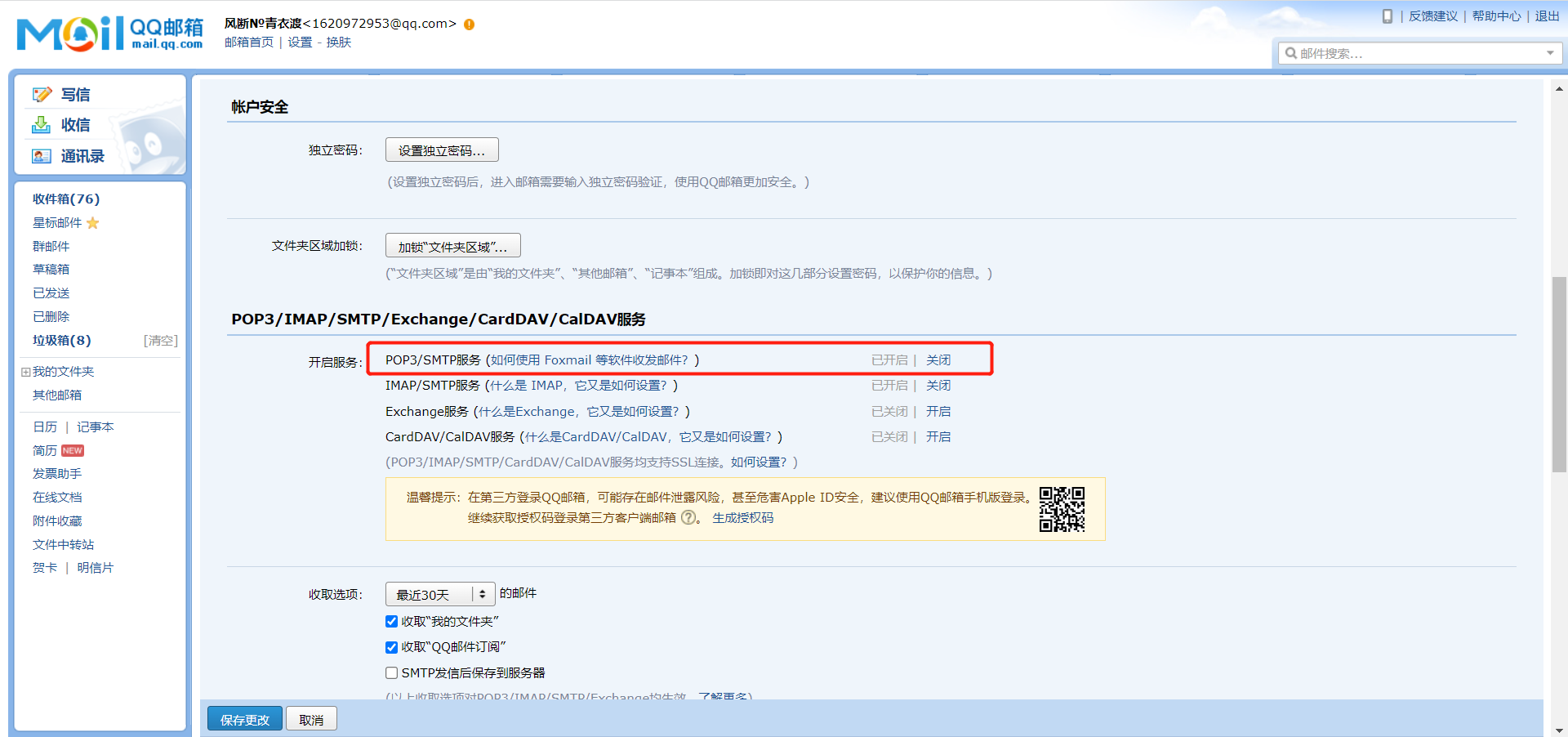SpringBoot17:异步、定时、邮件任务
异步任务
1、创建一个service包
2、创建一个类AsyncService
异步处理还是非常常用的,比如我们在网站上发送邮件,后台会去发送邮件,此时前台会造成响应不动,直到邮件发送完毕,响应才会成功,所以我们一般会采用多线程的方式去处理这些任务。
编写方法,假装正在处理数据,使用线程设置一些延时,模拟同步等待的情况
@Service
public class AsyncService {
public void hello(){
try {
Thread.sleep(3000);
} catch (InterruptedException e) {
e.printStackTrace();
}
System.out.println("数据正在处理....");
}
}
3、编写controller包
4、编写AsyncController类
我们去写一个Controller测试一下
@RestController
public class AsyncController {
@Autowired
AsyncService asyncService;
@RequestMapping("/hello")
public String hello(){
asyncService.hello(); // 停止三秒
return "OK";
}
}
5、访问http://localhost:8080/hello进行测试,3秒后出现OK,这是同步等待的情况。
问题:我们如果想让用户直接得到消息,就在后台使用多线程的方式进行处理即可,但是每次都需要自己手动去编写多线程的实现的话,太麻烦了,我们只需要用一个简单的办法,在我们的方法上加一个简单的注解即可,如下:
6、给hello方法添加@Async注解;
// 告诉Spring这是一个异步方法
@Async
public void hello(){
try {
Thread.sleep(3000);
} catch (InterruptedException e) {
e.printStackTrace();
}
System.out.println("数据正在处理....");
}
SpringBoot就会自己开一个线程池,进行调用!但是要让这个注解生效,我们还需要在主程序上添加一个注解@EnableAsync ,开启异步注解功能;
@EnableAsync // 开启异步注解功能
@SpringBootApplication
public class Springboot09AsyncApplication {
public static void main(String[] args) {
SpringApplication.run(Springboot09AsyncApplication.class, args);
}
}
7、重启测试,网页瞬间响应,后台代码依旧执行!
邮件任务
邮件发送,在我们的日常开发中,也非常的多,Springboot也帮我们做了支持
- 邮件发送需要引入spring-boot-start-mail
- SpringBoot 自动配置MailSenderAutoConfiguration
- 定义MailProperties内容,配置在application.yml中
- 自动装配JavaMailSender
- 测试邮件发送
测试:
1、引入pom依赖
<dependency>
<groupId>org.springframework.boot</groupId>
<artifactId>spring-boot-starter-mail</artifactId>
</dependency>
看它引入的依赖,可以看到 jakarta.mail
<dependency>
<groupId>com.sun.mail</groupId>
<artifactId>jakarta.mail</artifactId>
<version>1.6.7</version>
<scope>compile</scope>
</dependency>
2、查看自动配置类:MailSenderAutoConfiguration
这个类中存在bean,JavaMailSenderImpl
然后我们去看下配置文件
@ConfigurationProperties(
prefix = "spring.mail"
)
public class MailProperties {
private static final Charset DEFAULT_CHARSET;
private String host;
private Integer port;
private String username;
private String password;
private String protocol = "smtp";
private Charset defaultEncoding;
private Map<String, String> properties;
private String jndiName;
}
3、配置文件:
spring.mail.username=1620972953@qq.com
spring.mail.password=eccvnqzboomveijb
spring.mail.host=smtp.qq.com
# qq需要配置ssl
spring.mail.properties.mail.smtp.ssl.enabl=true
获取授权码:在QQ邮箱中的设置->账户->开启pop3和smtp服务
4、Spring单元测试
package com.edgar;
import org.junit.jupiter.api.Test;
import org.springframework.beans.factory.annotation.Autowired;
import org.springframework.boot.test.context.SpringBootTest;
import org.springframework.mail.SimpleMailMessage;
import org.springframework.mail.javamail.JavaMailSenderImpl;
import org.springframework.mail.javamail.MimeMessageHelper;
import javax.mail.MessagingException;
import javax.mail.internet.MimeMessage;
import java.io.File;
@SpringBootTest
class Springboot09AsyncApplicationTests {
@Autowired
JavaMailSenderImpl mailSender;
@Test
void contextLoads() {
// 一个简单的邮件~
SimpleMailMessage mailMessage = new SimpleMailMessage();
mailMessage.setSubject("小狂神你好呀~");
mailMessage.setText("谢谢你的狂神说系列课程~");
mailMessage.setTo("1620972953@qq.com");
mailMessage.setFrom("1620972953@qq.com");
mailSender.send(mailMessage);
}
@Test
void contextLoads2() throws MessagingException {
// 一个复杂的邮件~
MimeMessage mimeMessage = mailSender.createMimeMessage();
// 组装
MimeMessageHelper helper = new MimeMessageHelper(mimeMessage,true);
helper.setSubject("小狂神你好呀~plus");
helper.setText("<p style='color:red'>谢谢你的狂神说系列课程~</p>",true);
// 附件
helper.addAttachment("1.jpg",new File("C:\\Users\\86152\\Pictures\\tool\\1.jpg"));
helper.addAttachment("2.jpg",new File("C:\\Users\\86152\\Pictures\\tool\\1.jpg"));
helper.setTo("1620972953@qq.com");
helper.setFrom("1620972953@qq.com");
mailSender.send(mimeMessage);
}
}
查看邮箱,邮件接收成功!
我们只需要使用Thymeleaf进行前后端结合即可开发自己网站邮件收发功能了!
定时任务
项目开发中经常需要执行一些定时任务,比如需要在每天凌晨的时候,分析一次前一天的日志信息,Spring为我们提供了异步执行任务调度的方式,提供了两个接口。
- TaskExecutor接口
- TaskScheduler接口
两个注解:
- @EnableScheduling
- @Scheduled
cron表达式详解
Cron表达式是一个字符串,字符串以5或6个空格隔开,分为6或7个域,每一个域代表一个含义,Cron有如下两种语法格式:
(1) Seconds Minutes Hours DayofMonth Month DayofWeek Year
(2)Seconds Minutes Hours DayofMonth Month DayofWeek
一、结构
corn从左到右(用空格隔开):秒 分 小时 月份中的日期 月份 星期中的日期 年份
二、各字段的含义
| 字段 | 允许值 | 允许的特殊字符 |
|---|---|---|
| 秒(Seconds) | 0~59的整数 | , - * / 四个字符 |
| 分(Minutes) | 0~59的整数 | , - * / 四个字符 |
| 小时(Hours) | 0~23的整数 | , - * / 四个字符 |
| 日期(DayofMonth) | 1~31的整数(但是你需要考虑你月的天数) | ,- * ? / L W C 八个字符 |
| 月份(Month) | 1~12的整数或者 JAN-DEC | , - * / 四个字符 |
| 星期(DayofWeek) | 1~7的整数或者 SUN-SAT (1=SUN) | , - * ? / L C # 八个字符 |
| 年(可选,留空)(Year) | 1970~2099 | , - * / 四个字符 |
注意事项:
每一个域都使用数字,但还可以出现如下特殊字符,它们的含义是:
(1):表示匹配该域的任意值。假如在Minutes域使用, 即表示每分钟都会触发事件。
(2)?:只能用在DayofMonth和DayofWeek两个域。它也匹配域的任意值,但实际不会。因为DayofMonth和DayofWeek会相互影响。例如想在每月的20日触发调度,不管20日到底是星期几,则只能使用如下写法: 13 13 15 20 * ?, 其中最后一位只能用?,而不能使用,如果使用表示不管星期几都会触发,实际上并不是这样。
(3)-:表示范围。例如在Minutes域使用5-20,表示从5分到20分钟每分钟触发一次
(4)/:表示起始时间开始触发,然后每隔固定时间触发一次。例如在Minutes域使用5/20,则意味着5分钟触发一次,而25,45等分别触发一次.
(5),:表示列出枚举值。例如:在Minutes域使用5,20,则意味着在5和20分每分钟触发一次。
(6)L:表示最后,只能出现在DayofWeek和DayofMonth域。如果在DayofWeek域使用5L,意味着在最后的一个星期四触发。
(7)W:表示有效工作日(周一到周五),只能出现在DayofMonth域,系统将在离指定日期的最近的有效工作日触发事件。例如:在 DayofMonth使用5W,如果5日是星期六,则将在最近的工作日:星期五,即4日触发。如果5日是星期天,则在6日(周一)触发;如果5日在星期一到星期五中的一天,则就在5日触发。另外一点,W的最近寻找不会跨过月份 。
(8)LW:这两个字符可以连用,表示在某个月最后一个工作日,即最后一个星期五。
(9)#:用于确定每个月第几个星期几,只能出现在DayofWeek域。例如在4#2,表示某月的第二个星期三。
三、常用表达式例子
(0)0/20 * * * * ? 表示每20秒 调整任务
(1)0 0 2 1 * ? 表示在每月的1日的凌晨2点调整任务
(2)0 15 10 ? * MON-FRI 表示周一到周五每天上午10:15执行作业
(3)0 15 10 ? 6L 2002-2006 表示2002-2006年的每个月的最后一个星期五上午10:15执行作
(4)0 0 10,14,16 * * ? 每天上午10点,下午2点,4点
(5)0 0/30 9-17 * * ? 朝九晚五工作时间内每半小时
(6)0 0 12 ? * WED 表示每个星期三中午12点
(7)0 0 12 * * ? 每天中午12点触发
(8)0 15 10 ? * * 每天上午10:15触发
(9)0 15 10 * * ? 每天上午10:15触发
(10)0 15 10 * * ? * 每天上午10:15触发
(11)0 15 10 * * ? 2005 2005年的每天上午10:15触发
(12)0 * 14 * * ? 在每天下午2点到下午2:59期间的每1分钟触发
(13)0 0/5 14 * * ? 在每天下午2点到下午2:55期间的每5分钟触发
(14)0 0/5 14,18 * * ? 在每天下午2点到2:55期间和下午6点到6:55期间的每5分钟触发
(15)0 0-5 14 * * ? 在每天下午2点到下午2:05期间的每1分钟触发
(16)0 10,44 14 ? 3 WED 每年三月的星期三的下午2:10和2:44触发
(17)0 15 10 ? * MON-FRI 周一至周五的上午10:15触发
(18)0 15 10 15 * ? 每月15日上午10:15触发
(19)0 15 10 L * ? 每月最后一日的上午10:15触发
(20)0 15 10 ? * 6L 每月的最后一个星期五上午10:15触发
(21)0 15 10 ? * 6L 2002-2005 2002年至2005年的每月的最后一个星期五上午10:15触发
(22)0 15 10 ? * 6#3 每月的第三个星期五上午10:15触发
测试步骤:
1、创建一个ScheduledService
我们里面存在一个hello方法,他需要定时执行,怎么处理呢?
// 秒 分 时 日 月 周几
// 0 * * * * MON-FRI
// 注意cron表达式的用法;
@Scheduled(cron = "0/10 * * * * ?")
public void hello(){
System.out.println("hello,你被执行了~");
}
2、这里写完定时任务之后,我们需要在主程序上增加@EnableScheduling 开启定时任务功能
@EnableAsync // 开启异步注解功能
@EnableScheduling // 开启定时功能的注解
@SpringBootApplication
public class Springboot09AsyncApplication {
public static void main(String[] args) {
SpringApplication.run(Springboot09AsyncApplication.class, args);
}
}
3、我们来详细了解下cron表达式;





 浙公网安备 33010602011771号
浙公网安备 33010602011771号